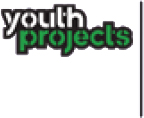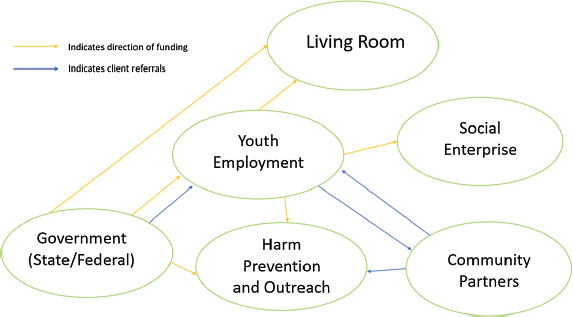13. Youth Projects
Ginetta Mammarella

About Youth Projects
Youth Projects are an independent, registered charity which supports disadvantaged young people in North and West metropolitan Melbourne. Youth Projects provides front line support to young people and individuals experiencing disadvantage, unemployment, homelessness, alcohol, and other drug issues. We also help those looking to re-engage with learning and employment. The impact we seek enables each person to:
- Lead longer lives
- Have improved health
- Participate in meaningful employment, and have
- A greater sense of belonging, safety, and security
Comprised of a highly skilled multi-disciplinary team, we can provide a complete wrap around, judgement free service with a strong focus on respect, client-centred care, and harm prevention. Youth Projects Organisational Structure includes a Board of Directors, Chief Executive Officer, Executive Manager of Employment, Training and Social Enterprise and Executive Manager of Community Health. The Employment, Training and Social Enterprise arm of Youth Projects includes programs:
- Disability Employment Services
- Employability Skills Training
- Here 4 Hospitality
- Jobs Vic Employment Services
- Transition to Work
- Youth in Hume Outreach Program
- The Little Social Café (Hosier Lane, Alfred Health, Rosanna Metro)
Community Health features range of programs focused on Harm, Prevention and Outreach, such as:
- Needle Syringe Program
- Proactive Response Initiative
- Peer Support Programs
- Youth Northern Outreach Team
- Hotel Outreach Initiative
In addition, a range of services are provided through the Living Room program, including a Primary Health Service, Substance Misuse Team and After Hours Outreach. The relationship between each of these key focus areas, including funding and client referrals, is indicated in the Youth Projects Eco-Map (Figure 3).

Figure 3: Youth Projects Eco-Map © Youth Projects.
This figure is used with the permission of Youth Projects and is not to be reproduced without permission. For more information, go to https://www.youthprojects.org.au/.
Youth Projects operates through a clinical governance framework aimed at accountability for consumer care, outcomes and organisational performance. This is informed through the Risk Management Policy, Incident Management Policy, Quality Policy and Manual, Standard Operating Procedures, Improvement procedure and the Critical Incident Management Policy. While Youth Projects can apply to access various forms of government funding a large portion of the organisation is funded through the employment and education department, which is funded by JobActive for supporting disadvantaged youth accessing employment (similar to other JobActive providers).Youth Projects works with a number of other community organisations in collaborative partnerships to achieve the best possible outcomes for young people, particularly other youth support organisations who are not Transition to Work providers for JobActive. Additionally, there are organisational relationships with Centrelink, JobActive and the Disability Employment Service funder.
Youth Projects approach to working with young people
Youth Projects is designed to operate through an anti-oppressive approach. This is evident through recognition that service-users’ lives have been impacted and influenced through the overarching cultural and structural influences which create barriers to their success, in addition to personal influences. Youth Projects advocates for social change that will impact the lives of disadvantaged youth, with a focus on addressing personal, cultural and structural barriers that their service-users navigate.
Youth Projects implements a trauma-informed approach to practice in working with youth that face barriers to employment and education. While the organisation extends beyond this with outreach, needle exchange programs, homelessness support, etc. a primary focus of Youth Projects is supporting access to stable employment or education. In supporting youth to access this stable education or employment there is a key focus on utilising a strengths based approach. This approach empowers young people who may be experiencing a number of barriers including poor mental health, low socio-economic positioning, substance misuse, homelessness and may have low self-esteem. A strengths-based approach reiterates observable strengths while supporting the young person to explore their strengths and how these can be applied to future endeavours.
The focus of Youth Projects in supporting young people to access stable employment, housing and positive mental health is undertaken first through person centred goal planning. This is achieved through motivational interviewing (MI) and effective communication strategies such as use of silence and active listening. MI supports service users to explore their situation and allows for workers to pick out strengths of the service user as well as ensure a person-centred approach to practice. Once a treatment/action/goal plan is developed the service users are encouraged to be the agent of change with support and working towards improved coping skills and through counselling an understanding of why maladaptive coping mechanisms were used by the service user and strategies to move beyond these are encouraged and supported. This approach to improving the lives of young people reflect solutions focused practice and a psycho-dynamic approach.
The use of systems approaches is also evident, with an emphasis on how multiple and interacting social systems either enhance or limit well-being. This approach informs practice though is used minimally in client facing services, as there seems to be a lack of use of this when engaging with service users but rather used by management to inform the scope and direction of practice. Youth Projects uses a crisis intervention problem solving approach, with structured approaches to empowering young people and supporting them to achieve the goals they developed from a person-centered approach to practice.
Response to Covid-19
Throughout the Covid-19 pandemic, Youth Projects have continued to run programs. Essential youth outreach programs like Footies, involving foot patrol staff who walk along the streets and hand out either clean syringes, medical supplies or food to the homeless young people, have continue. In other instances, programs have moved to virtual delivery. This has presented some challenges in terms of connecting with young people. The staff have found that some young people in crisis do not want to participate in a zoom or phone calls. However, programs such as the Living Room never closed, while our social enterprise cafés continue to provide takeaway options and support employment opportunities for young people. Youth Projects have also held large-scale online events, such as a Virtual Youth Summit in conjunction with the Hume City Council.
A key organisational challenge throughout the pandemic has been the fatigue experienced by staff, particularly coming in and out of lockdowns. The staff have attempted to create a supportive environment online by playing games together as a team, trying to keep spirits up and celebrate as much as we can. This is aimed at addressing drops in energy and morale, among staff and also students on placement. Our leadership team has played a key role in making sure that everyone is supported and is also up to date with relevant information. Despite the difficulties experienced by staff and students, key services have been delivered, and new ways of adapting to a constantly changing environment have been found.
One of the most significant learnings to take from the experiences of the past couple of years, is to always have a back up plan. Nothing is permanent, meaning it is essential to plan for all scenarios, plan things virtually and face to face, in case of social distancing restrictions being implemented. This requires good organisation, and being able to respond quickly to new circumstances as they arise.
Youth Projects Placement Model
Youth Projects aim to provide student placements which support student learning and growth. Students are treated like staff members. Placement students are included in the work undertaken, including team meetings and group celebrations. Students completing placements with Youth Projects come from a variety of universities and educational institutions, studying in areas such as community work, youth work and social work. When a student nominates to complete a placement with Youth Projects, the Program Manager completes a success profile, conducts an interview and obtains paperwork from the educational institution. Following a successful interview, the student is asked to provide a national police check and Working with Children’s Check. Commencing placement students are allocated to a program and a task supervisor that has a social work background that can support the student to make connections from social work theories to their practical work and work on the project for the duration of their student placement. The task supervisor meets the student for weekly supervision. While at Youth Projects student is given opportunities to explore and emerge themselves in other programs and experience the wrap around service Youth Projects provides. Upon commencement in the student’s placement, the student enters an induction process. The induction process includes meeting with supervisor and the team, knowledge the policies and procedures and knowledge of the Covid-19 safe plan.
RMIT student comments on placement experience
This student completed a placement with Youth Projects between February and June, 2021:
My time at Youth Projects has been valuable. While I did feel frustration with what I perceived to be a lack of client contact whilst on placement due to the lockdown, I can see now that the experiences I did have, and the subsequent discussion of these experiences with my Field Educator who helped me learn from them, taught me so much about what sort of a social worker I want to be. As a former teacher, being placed on the Community Traineeships Pilot Program (CTPP) where most of my client contact was during class was at first frustrating, but it helped me make the distinction between teacher and social worker which was always going to be very important for me to work out. I have gained insight into Youth Projects and increased my knowledge of the programs and services they offer. In working on the CTPP I was able to increase my experience in relation to inter-agency collaboration.
One of the key areas of learning development has been my increase of theoretical knowledge. I feel much more confident in considering practice events through a theoretical lens while considering the micro, mezzo and macro considerations. In addition, my critical reflection skills have increased greatly, while I felt I was able to reflect previously my capacity to critically reflect has significantly increased. My improved critical reflection skills have improved my ability to identify my values/social locations.
I’ve appreciated the ongoing support my Task Supervisor has given me, as well as other staff at Youth Projects who have encouraged and supported me to experience other areas of the organisation. My discussions with my Field Educator have been instrumental in helping me link theory to practice. I have likewise always had the freedom at Youth Projects to create appropriate opportunities for me to continue exploring this link. My supervision sessions with my Field Educator have also helped me gain a deep appreciation of what the client-centred approach looks like in practice, and how to tailor my communication with clients accordingly. I can see the value this approach has for clients, as well as in my work as a social worker, and I’m looking forward to developing these skills more.
Conclusion
The pandemic has provided opportunities to continue to provide placements to students. During 2020-2021 student placements have continued both as a mix of onsite and virtually, due to the Melbourne lockdowns. When on site, students are provided with their own workstation and equipment such as a work phone. While on site the student is required to check in as per Covid-19 safe rules and always wear a mask except for eating and drinking. All students are included in team meetings and internal celebrations. The students are provided with any equipment that will add to their ergonomic workstation at home. Students are provided with weekly supervision and regular check in meetings while working during lockdown.

